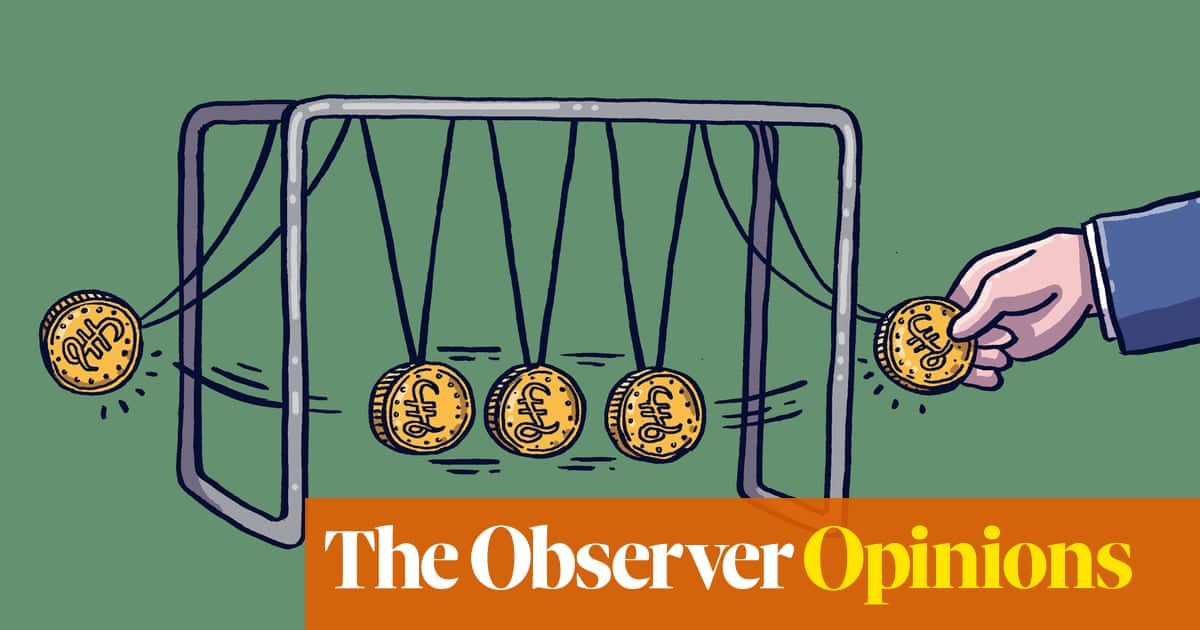
The British corporate sector is dying in front of our eyes. Corporate decay and the lifelessness of our stock market, now ranking a mere 10th in the world, affects everything: jobs, careers, good wages, pensions, tax revenues and vibrant public services. Worse, Britain is rich in the research and intellectual knowledge on which successful 21st-century economies will be founded: the opportunity is being squandered. Decisively addressing what is happening must be at the forefront of the 2024 electoral debate.
What needs fixing is the financial doom loop in which our publicly listed companies are locked. Britain has organised its savings system not to support British company formation and growth. In essence our pension funds, the single most important way we save collectively and a source of finance for business, have been set up so that increasingly the “risk” of investing in British companies has been avoided or not undertaken at all. Michael Tory, former Morgan Stanley banker and co-founder of the investor advisory consultancy Ondra, calculates in his research paper “Britain plc in Liquidation” that in 1990 UK pension funds owned more than £1tn worth of UK companies; now they hold less than £100bn. Increasingly, they invest in safety-first government bonds or in destinations overseas. It is a de facto investment strike – a wrong-headed attempt to make pension funds so safe they are killing our economy and paradoxically themselves.
Since 2006, the valuation of a like-for-like company quoted on the London stock market compared with stock markets in the US or Europe has fallen on average by a third. British companies are under-invested in, undervalued, and thus fatally wounded. The consequences are dire. To try to stop the rot, British companies become very short term, withdrawing from markets to hoard their profits, failing to develop new products and trying to assuage their remaining shareholders with big dividends and buying back shares at inflated prices. They hold down wages. In the main, they daren’t raise any new money for vital investment – it would depress the share price even further.
All to no avail. In the years to 2000, British companies were on balance buying more assets overseas than selling them: since then, the boot has been on the other foot – undervalued British companies are huge targets for foreign takeover. Twenty years ago, two-thirds of all dividends were paid to British shareholders so the cash stayed here; now, Michael Tory calculates, only a quarter of remuneration ends up in British hands. Worse, British companies have another financial monkey on their backs; irrational accounting rules forced them to pay £250bn over the past decade into their company pension funds to compensate for alleged funding shortfalls that in fact were an accounting fiction – largely eliminated as interest rates rose. Structural undervaluation; paying unnecessarily high dividends; vast cash leakage overseas and excessive pension contributions are the four riders of an investment apocalypse, says the Ondra paper. Britain has created no great companies in the past 20 years; instead, 50 firms that would have been in the FTSE 100 are now foreign-owned, with the pace quadrupling since Brexit. Leaving the EU closed vital markets, marginalised the City and has led to a further markdown of corporate valuations accelerating the doom loop. Very few new companies are emerging on any scale to compensate.
It needs fixing as a national priority – but for free marketeers this vicious circle should not be happening. In their conception, we live in a borderless world in which capital flows seamlessly to wherever there is profit. Except it doesn’t. Once a country has created a doom loop, the only long-term direction is down, and foreign investors see no reason why they should take the lead in reversing what is happening. Instead, they become predators looking to make off with some rich pickings. Britain is no longer affluent enough as a country to neglect our own backyard: we need some smart home bias to direct our savings to our own companies.
The elements of reform are obvious. Trying to abolish risk leads the economy to self-immolate. UK companies in aggregate warrant their shares being bought, and, if all pension funds simultaneously directed disproportionately more of their assets to the UK, it would lift corporate Britain off the rocks. It is a classic case of where the state has to act decisively because the market can’t and won’t. Absurdly, Britain has tens of thousands of pension funds: they are too small – they must all be consolidated into super pension funds, modelled on the existing Pension Protection Fund (PPF), which can spread risk.
The next step is to incentivise investment in UK companies. Australia and Canada offer tax credits for home-based investors investing in their listed home companies; Britain should follow suit. Investment Savings Accounts (ISAs) should only be tax exempt if investment is made in UK shares. A proportion – say, 5% – of pension fund assets should be organised collectively in a national growth fund to invest in startups, and backstopped by a public wealth fund. The new companies should be incentivised to list in London; if they list abroad, they should repay any grants to the UK taxpayer.
Chancellor Jeremy Hunt has been circling this issue: in November’s autumn statement, he announced small pension funds could join the PPF – and a consultation was launched on creating a pension fund “consolidator” by 2026. Worthwhile steps, but Hunt is hamstrung by fear that the Tory right will claim the government is interfering “socialistically” in the private sector, playing politics with future pensions – with parts of the insurance industry protesting along these lines.
Wrong. Pensions would be higher if greater returns could be generated as the payback for better managed risk, let alone the wider economic benefit – and special pleading should be recognised for what it is: in fact, some of the smarter in the City are on the side of reform. Instead, the whole process needs turbo-charging: if this is “socialism”, it is much required. Step forward a future Labour government that could do just that, especially armed with its planned public wealth fund as part of its £28bn green prosperity plan, wrongly under fire from the right, and on which its confidence seems to be faltering. It is an essential ingredient of a comprehensive new investment settlement. The doom loop must be broken.
Will Hutton is an Observer columnist












